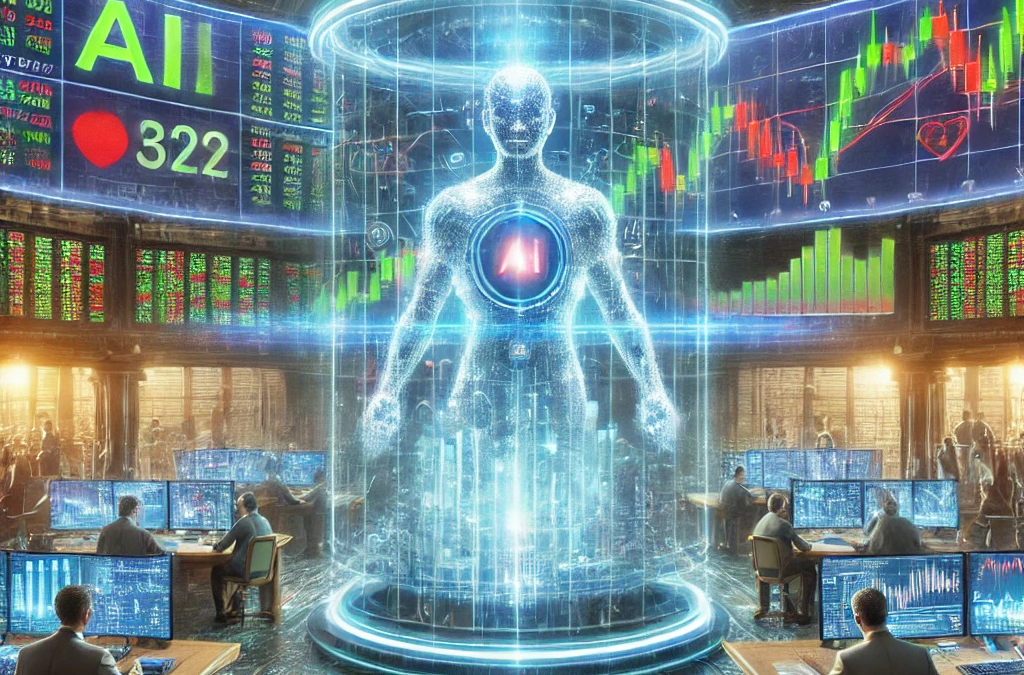Want to Beat the Market? AI’s Game-Changing Role in Trading Strategies Explained
For decades, investors have sought ways to consistently outperform the market. With the rise of Artificial Intelligence (AI), we are now seeing revolutionary advancements in trading strategies that make this once elusive goal more attainable. AI has taken the financial world by storm, offering traders data-driven insights, predictive analytics, and automation capabilities that far exceed human capacity.
In this article, we’ll break down how AI is transforming trading strategies, explain why it’s becoming a game-changer for investors, and show you how AI can help you beat the market.
How AI is Revolutionizing Trading Strategies
AI’s impact on trading strategies can be summed up in one word: efficiency. The ability of AI to process vast amounts of data, spot patterns, and execute trades faster than any human has led to a new era of algorithmic trading and data-driven decision-making. Let’s explore how AI is reshaping the way we trade.
1. AI-Powered Algorithmic Trading
One of the most impactful uses of AI in trading is through algorithmic trading, where algorithms are used to execute trades based on pre-defined criteria such as timing, price, and volume. These AI-driven algorithms analyze real-time data, constantly scanning markets for opportunities.
Key Benefits of AI-Powered Algorithmic Trading:
- Speed: AI systems can execute trades in milliseconds, giving traders the ability to capitalize on price movements much faster than human traders.
- Consistency: AI sticks to the data and algorithms, removing the emotional biases (fear, greed, overconfidence) that often plague human traders.
- 24/7 Market Monitoring: AI systems can operate non-stop, analyzing global markets in real-time and making decisions on your behalf, ensuring that you never miss a trading opportunity.
Example: Many hedge funds use AI to manage high-frequency trading (HFT), where algorithms execute thousands of trades in fractions of a second. These trades aim to exploit tiny price discrepancies in the market, allowing firms to profit from small fluctuations that human traders would miss.
2. Predictive Analytics for Market Forecasting
AI’s ability to predict market movements is perhaps its most exciting contribution to modern trading strategies. By analyzing massive datasets that include historical market data, global news, social media sentiment, and economic indicators, AI can make highly accurate forecasts about future price movements.
How AI Improves Market Forecasting:
- Pattern Recognition: AI can identify patterns in market data that are too complex or subtle for humans to detect, giving it a significant edge in predicting price trends.
- Sentiment Analysis: AI-powered sentiment analysis tools scan social media, news sources, and corporate reports to gauge public sentiment around particular stocks or industries, offering insights that help forecast market behavior.
- Real-Time Adjustments: As market conditions change, AI algorithms continuously adjust their models, making them more adaptable to sudden shifts in market sentiment or global events.
Example: AI-based platforms like Kavout combine financial data, technical indicators, and sentiment analysis to create a K Score—a predictive ranking system for stocks that helps traders make better-informed decisions about which stocks are poised to outperform.
AI’s Role in Personalized Trading Strategies
AI isn’t just about broad market analysis—it also plays a crucial role in creating personalized trading strategies that align with individual goals, risk tolerance, and investment preferences. By analyzing your past trades, financial habits, and risk appetite, AI can recommend strategies that are uniquely tailored to your profile.
1. Robo-Advisors for Personalized Trading
Robo-advisors are AI-powered platforms that automatically manage investment portfolios based on user-defined goals, such as retirement savings, wealth growth, or risk management. These platforms use AI to create a portfolio strategy that fits your individual profile and adjusts it automatically based on market conditions.
How Robo-Advisors Benefit Traders:
- Low Costs: Robo-advisors typically charge lower fees than traditional financial advisors while offering a high level of service.
- Automated Rebalancing: AI rebalances portfolios as market conditions change, ensuring your portfolio stays aligned with your investment goals.
- Goal-Driven Strategies: Based on your personal financial objectives, AI allocates your investments into stocks, bonds, or other assets that match your risk tolerance and long-term goals.
Example: Platforms like Betterment and Wealthfront use AI to offer personalized investment advice and automated portfolio management. They help investors of all sizes develop strategies to maximize returns while minimizing risk.
2. AI-Driven Risk Management
Effective risk management is key to long-term success in trading, and AI’s ability to monitor and manage risk is unparalleled. With AI, traders can analyze real-time risk factors such as market volatility, liquidity risks, and global economic changes to make informed decisions that protect their investments.
How AI Enhances Risk Management:
- Real-Time Monitoring: AI systems can continuously scan markets for signals that indicate increased risk, such as political instability, unexpected economic reports, or sudden market crashes.
- Predictive Risk Analysis: AI can predict the likelihood of major market downturns, enabling traders to hedge against potential losses by adjusting their portfolios or buying protection such as options or futures contracts.
- Stress Testing: AI can run simulations to see how your portfolio would perform under various stress scenarios (e.g., economic recession, currency crash), helping you prepare for worst-case situations.
Example: AI-driven platforms like QuantConnect allow traders to backtest their strategies under various market conditions, giving them insights into how their strategies would have performed historically and how to optimize them for future scenarios.
AI’s Growing Influence on High-Frequency Trading (HFT)
AI is especially valuable in high-frequency trading (HFT), where massive volumes of trades are executed within milliseconds. HFT relies heavily on algorithmic trading and is driven by speed, efficiency, and precise execution.
Why AI Dominates in High-Frequency Trading:
- Speed: AI algorithms can execute trades within milliseconds, reacting to market changes far faster than any human trader could.
- Profit from Small Fluctuations: HFT strategies typically rely on profiting from tiny price discrepancies that only exist for microseconds. AI’s ability to process data and execute trades in real time allows it to capitalize on these opportunities.
- Volume: AI can execute a large number of trades simultaneously across various markets, diversifying and spreading risk while maximizing returns.
Many investment firms now rely on AI to execute their high-frequency trades. By 2025, HFT driven by AI will likely account for an even larger percentage of market trading volume, increasing market liquidity and efficiency.
The Advantages of AI Over Human Traders
While human intuition and experience still play a role in trading, AI has distinct advantages that often outperform human traders, particularly in volatile or complex markets.
1. Data Processing and Analysis
AI can process vast amounts of data from various sources—far more than any human trader could manage. It analyzes data from historical trades, economic indicators, social media, and even real-time news, processing it in seconds and making informed decisions instantly. In contrast, human traders are limited by time and cognitive capacity.
2. Unbiased and Emotionless Trading
Human traders are often influenced by emotions such as fear and greed, which can lead to irrational decision-making. AI, on the other hand, trades based purely on data and logic, without emotional interference. It consistently applies its rules, ensuring disciplined and calculated decision-making, even in volatile markets.
3. Adaptability and Learning
AI trading systems are constantly learning from new data and adjusting their strategies in real time. They can adapt to market conditions that change daily, hourly, or even by the minute. This adaptability allows AI to remain ahead of trends and market movements, offering traders a competitive edge.
The Future of AI in Trading
AI’s influence on trading is only expected to grow as technology evolves. Here are a few trends that will shape the future of AI-driven trading:
1. Advanced Machine Learning Models
Future trading strategies will rely on more advanced machine learning models that are capable of deeper analysis, such as deep learning and reinforcement learning. These models will enhance AI’s ability to predict market trends and make decisions based on highly complex, nonlinear relationships in market data.
2. Integration with Quantum Computing
As quantum computing becomes more accessible, it will work hand-in-hand with AI to solve even more complex financial problems. Quantum computing could exponentially increase the speed at which AI models process data, unlocking new possibilities for forecasting, arbitrage, and risk management.
3. Ethical and Regulatory Considerations
As AI becomes more prevalent in financial markets, regulators will need to adapt to ensure that these systems are transparent, fair, and free from biases. The increased use of AI will likely lead to more stringent regulations around algorithmic trading, high-frequency trading, and automated decision-making to ensure market integrity and investor protection.
AI is the Future of Trading
As AI continues to revolutionize trading strategies, its impact on the financial markets will only become more profound. From real-time data analysis and predictive market forecasting to algorithmic trading and personalized investment strategies, AI is helping traders beat the market in ways that were once impossible.
Whether you’re a seasoned investor or just starting out, leveraging AI-driven platforms can help you stay ahead of market trends, make better decisions, and optimize your portfolio for success. In a world where data moves at lightning speed, the future of trading belongs to those who harness the power of AI.




